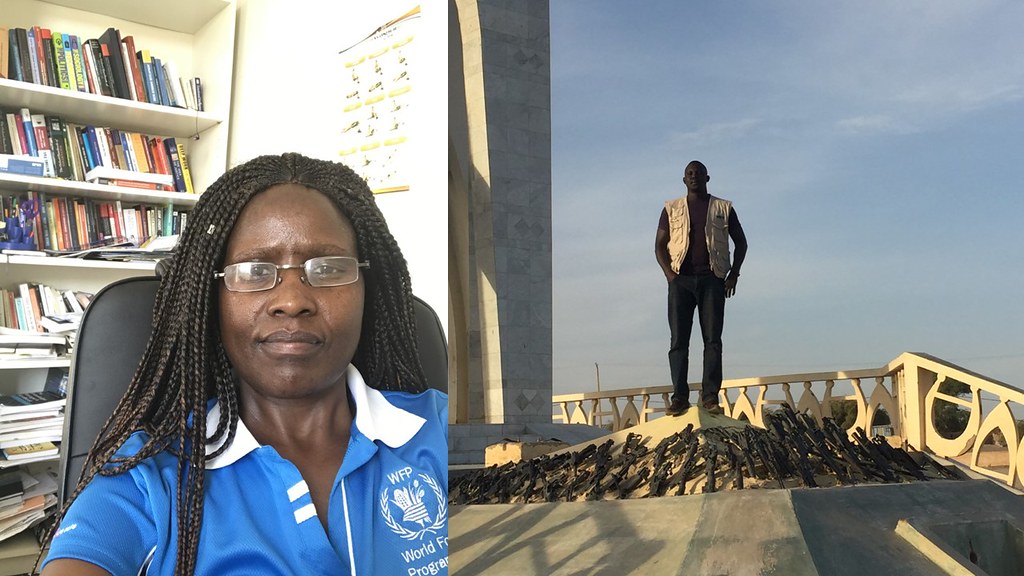Two University of Bath students on the Institute for Policy Research (IPR)'s Professional Doctorate in Policy Research and Practice (DPRP) are celebrating after their organisation was announced as the recipient of this year’s Nobel Peace Prize 2020.
Last week the Norwegian Nobel Committee announced its decision to award this year’s Prize to the World Food Programme (WFP) for its efforts in combatting hunger, for its contribution to bettering conditions for peace in conflict-affected areas, and for acting as a driving force in efforts to prevent the use of hunger as a weapon of war and conflict.
Bath students Grace Igweta and Willy Nyeko, both based in Africa and currently studying part-time through distance-learning at the University, have worked for the WFP over a number of years. For them, the prestige and international recognition the Nobel Peace Prize brings will help to cement in people’s minds around the world the importance of alleviating hunger and suffering, which continues to afflict so many.
Speaking from the World Food Programme's Offices in South Africa, Grace told us: “We are deeply humbled that the World Food Programme has been honoured with the Nobel Peace Prize. Many of us who have worked with WFP for many years know too well that the job we do and how well we do it can determine whether a man or woman has a meal on their table on any given day. To those of us who grew up in poverty, the job we do is personal. We know what it means to go without a meal, and if there is something we can do to ensure no one else does, we do it.
“This prize puts the struggle of the 690 million people who go to bed hungry each day at the centre of the world’s attention and we welcome this. The people that work at WFP are incredibly committed. Hopefully we can use this recognition to show that by working together, we can contribute to a more peaceful world in which no man, woman or child goes to bed hungry.”
Originally from Kenya, a 16-year career with the WFP has seen Grace deployed around East and Southern Africa in addition to working for three years at WFP headquarters in Rome Italy. In 2004 she started in South Sudan when the country was shifting from the long civil war with the North towards a peace agreement. Most recently, in 2017, she transferred to Johannesburg where she now supports 12 WFP country offices in planning, commissioning and managing independent evaluations of the organisation’s work and programmes.
Her focus area through her studies at Bath looks at how social policies across sub-Saharan Africa have evolved over time. Reflecting on the DPRP with the University, she explains: “My study through the DPRP at the University of Bath is helping me in deepening my understanding of social policies in general, and social protection in particular. This in turn is helping me make better contribution to WFP’s role in this regard.”
Willy, who grew up in Uganda, recently deployed from Syria to Somalia where he serves as Head of Security for the WFP.
Commenting, he said: "Having grown up in a war zone in northern Uganda; and having served in several countries in conflict in Africa and in the Middle East, the self-perpetuating linkage between hunger and conflict has only been painfully evident. I have had a front row seat in seeing the level of suffering of those who have been pulled into the conflict by no fault nor interest of their own. Women, children and the weak being preyed on and suffering from shortage of the things that most of the world has come to take for granted.
"I think this award shines a positive spotlight not only on WFP but related and partner entities that are working tirelessly, with their employees sometimes paying the ultimate price, to bring food to the needy. I hope that the award not only increases awareness of what the organisation does but also garners support from all corners of life towards this solving this fundamental problem that will certainly have positive domino effects in peace as well quality of life on a global basis."
Professor James Copestake, Director of Studies for the Professional Doctorate in Policy Research and Practice and Director of the Centre for Development Studies at the University, said: “Every day the WFP helps millions of people around the world to cope with and recover from hunger – whether arising from conflict, climate change or other shocks to their lives and livelihoods. I hope the Peace Prize will help to draw attention to the chronic underfunding it faces in providing even a basic global safety net.
“We are honoured to be able to link up with mid-career professionals like Grace and Willy, whose commitment is revealed by a willingness to combine their demanding day jobs with research into how hunger, and the reasons for its persistence, can be reduced more effectively.”
Find out more about Grace, Willy and other doctorate students at the IPR.
The future is in our lands
The announcement coincides with World Food Day on Friday 16 October, a celebration of the founding of the Food and Agriculture Organization of the UN in 1945 and a diary date recognised by many other organisations committed to improving with food security.
This year the University’s IPR has undertaken a series of events highlighting challenges around the food supply chain and food security, as part of its series ‘The Future is in Our Lands’.
At an upcoming online event taking place next week, Tim Lang (Professor of Food Policy at City, University of London’s Centre for Food Policy) will be joined by Jo Lewis (Strategy and Policy Director at the Soil Association), to discuss food and social resilience in the UK in the context of Brexit.

